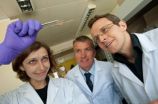Research identifies on-off switch for key 'factor' in heart disease and cancer
2011-04-07
(Press-News.org) Scientists at the University of Hull have identified a cellular 'on-off' switch that may have implications for treating cardiovascular disease and cancer.
The team has found the mechanism which controls the inclusion of a protein called tissue factor into endothelial microparticles, tiny vesicles which are released from cells in the lining of blood vessels.
"Although tissue factor is part of the body's natural healing process, helping create clots to stop bleeding and repair injuries, high levels circulating in the blood stream can be harmful," says lead researcher Dr Camille Ettelaie. "Excessive tissue factor is linked to cardiovascular disease, including the formation of irregular blood vessels and higher risk of thrombosis, leading to heart attack and stoke."
Dr Ettelaie and co-researcher Dr Mary Collier found that two tandem amino acids within tissue factor work like an 'on-off switch' within the cells, controlling how and when it is incorporated into the microparticles and released. When a phosphate molecule is added to the first one of these two amino acids, the process starts and when added to the other, it stops.
By blocking the addition of the phosphate molecules to the first amino acid, the researchers were able to stop the process – opening up the possibility of controlling when and how much tissue factor is released in microparticles.
"The aim of the research was to see if there might be a way to control the output of tissue factor from endothelial cells into microparticles," says Dr Ettelaie "This project focused on the vascular system and is helpful in controlling thrombosis, but tissue factor is also released in microparticles from cancer cells and linked to cell proliferation – so our findings could have implications for treating cancer as well.
"Tissue factor is exploited by cancer cells – they use it to speed up their growth directly, and also increase the growth of blood capillaries which supply the tumour with nutrients – but if levels of tissue factor are too high within a cell, then the cell will die. If we could use this switch to stop cancer cells getting rid of excess tissue factor, it might be possible to kill them without causing detrimental effect to the body's normal cells."
The findings from the research – which was partly funded by Yorkshire Cancer Research and the Castle Hill Hospital Cancer Trust Fund – are published in the latest issue of Journal of Biological Chemistry (April 8).
INFORMATION: END
ELSE PRESS RELEASES FROM THIS DATE:
2011-04-07
Excess fat around the hips and belly may not really be compatible with current beauty ideals, but, to a certain degree, it is a normal, even vital energy store of our body. However, it is a different matter if the organism stores fat in organs such as the liver, pancreas or muscles. This is a clear sign of a metabolic disorder.
Up to 80 percent of obese people develop fatty liver disease, which is regarded a typical characteristic of the dangerous metabolic syndrome. Deposition of fat in the liver may lead to chronic liver inflammation and even to liver cancer. In addition, ...
2011-04-07
At Karlsruhe Institute of Technology (KIT), researchers of the DFG Center for Functional Nanostructures (CFN) succeeded in specifically cultivating cells on three-dimensional structures. The fascinating thing is that the cells are offered small "holds" in the micrometer range on the scaffold, to which they can adhere. Adhesion is possible to these holds only, not to the remaining structure. For the first time, cell adhesion and, hence, cell shape are influenced precisely in three dimensions. The team headed by Professor Martin Bastmeyer thus has achieved big progress in ...
2011-04-07
Scientists have shed new light on how older people may lose their memory with a development that could aid research into treatments for age-related memory disorders.
Many believe that stress is bad for our brains especially as we get older. Now researchers have shown how two receptors in older brains react to a stress hormone called cortisol, which has been linked to increasing forgetfulness as we age.
The study, by the University of Edinburgh, found that one receptor was activated by low levels of cortisol, which helped memory.
However, once levels of this stress ...
2011-04-07
Researchers at the University of Warwick have developed a gold plated window as the transparent electrode for organic solar cells. Contrary to what one might expect, these electrodes have the potential to be relatively cheap since the thickness of gold used is only 8 billionths of a metre. This ultra-low thickness means that even at the current high gold price the cost of the gold needed to fabricate one square metre of this electrode is only around £4.5. It can also be readily recouped from the organic solar cell at the end of its life and since gold is already widely ...
2011-04-07
Long term users of the popular recreational drug ecstasy (MDMA) risk structural brain damage, suggests preliminary research published online in the Journal of Neurology, Neurosurgery and Psychiatry.
Other research has suggested that people who use ecstasy develop significant memory problems, so the Dutch researchers wanted to find out if there was any clinical evidence of structural changes in the brain to back this up.
They focused on the hippocampus, which is the area of the brain responsible for long term memory.
They measured the volume of the hippocampus using ...
2011-04-07
Electronic medical records (EMRs) are garnering deeper use in the community hospital scene, and nearly all have been certified HITECH-ready by an official certification body. Nevertheless, a fifth of these hospitals plan to switch EMR products within the next couple of years -- even this close to meaningful use (MU) deadlines -- according to a new report by KLAS.
For the new report, "Community Hospital EMRs Maturing for Meaningful Use," KLAS interviewed more than 500 healthcare professionals about their experience with various EMR systems. Of respondents, 80 percent ...
2011-04-07
A spot of regular retail therapy really does seem to help people live longer, suggests research published online in the Journal of Epidemiology and Community Health.
And it seems to benefit older men the most, the findings show.
The authors base their findings on almost 1,850 elderly (65+) Taiwanese people who were living independently at home, and included in the nationally representative Elderly Nutrition and Health Survey in Taiwan (NAHSIT Elderly), carried out in 1999-2000.
Participants were asked how often they went shopping, with options ranging from "never" ...
2011-04-07
Epileptic seizures can precede the development of a subsequent brain tumour by many years, suggests research published online in the Journal of Neurology, Neurosurgery and Psychiatry.
The risk seems to be greatest among those aged between 15 and 44 when first admitted to hospital for an epileptic seizure, the findings show.
The researchers base their findings on first time admissions for epilepsy from the Oxford Record Linkage Study (ORLS) for 1963 to 1998, and national Hospital Episode Statistics (HES) data for England for 1999 to 2005.
These data were then linked ...
2011-04-07
Financial Spreads, the UK-based spread betting company, has introduced another set of improvements for their clients.
This year Financial Spreads have already tightened their spreads on a number of popular markets in order to lower the cost of trading for clients. They have also introduced Guaranteed Stops in order to help clients with their risk management. The spread betting company has now introduced 'differential markets'.
Financial Spreads Spokesperson Adam Jepsen says that introducing differential markets not only offers account holders more choice, but better ...
2011-04-07
Disease-causing bacteria carrying the new genetic resistance to antibiotics, NDM-1, have been discovered in New Delhi's drinking water supply.
A Cardiff University-led team found new strains of resistant bacteria in the Indian capital, including species which cause cholera and dysentery. The findings are the first evidence of the environmental spread of NDM-1, which had previously only been found in hospitals.
The scientists are calling for urgent action by health authorities worldwide to tackle the new strains and prevent their global spread. The Cardiff scientists ...
LAST 30 PRESS RELEASES:
[Press-News.org] Research identifies on-off switch for key 'factor' in heart disease and cancer


